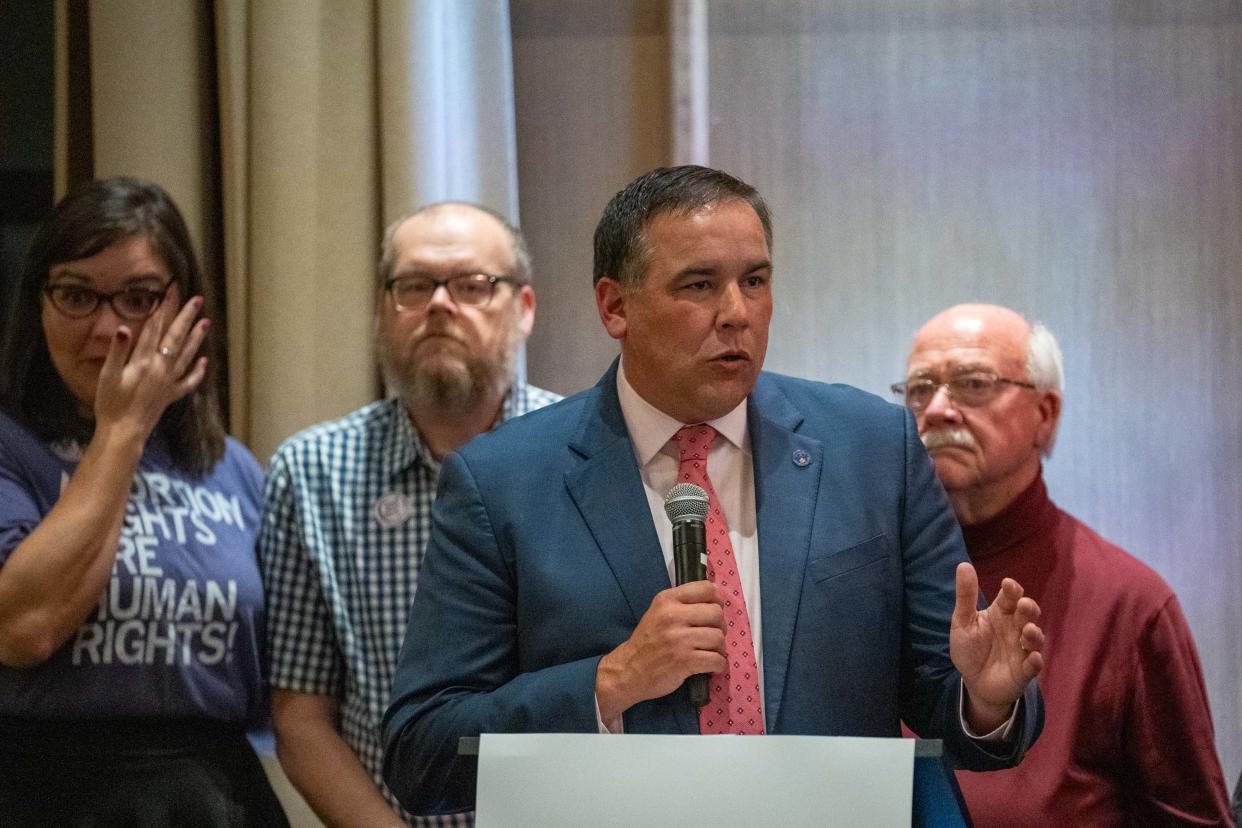Special prosecutor to investigate Ginther's call to judge in Columbus bus terminal case

The Columbus City Attorney's office has agreed to appoint a special prosecutor to investigate allegations that Mayor Andrew J. Ginther's called a judge, telling her how to rule on a pending case.
Columbus City Attorney Zach Klein's office has appointed Brad Nicodemus, an assistant city attorney for Whitehall, to look into Ginther allegedly telling Franklin County Environmental Judge Stephanie Mingo in early October that she should agree with the city and shutter a controversial new Greyhound bus depot on the West Side.
“Whitehall City Attorney Brad Nicodemus has agreed to independently review the allegations because of a conflict of interest our office has in representing the city in the Greyhound case," Klein's office said in an email.
The special prosecutor is in response to an attempt by Joe Motil, Ginther's unsuccessful political opponent in the November mayoral race, to file an affidavit and complaint in Franklin County Municipal Court claiming that Ginther's actions violated Ohio civil rights law, said Phil Harmon, a Columbus attorney representing Motil.
The clerk of court would not accept the document, which Harmon said would have triggered some type of court review or an investigation by a prosecutor, Harmon said. But on Thursday the city attorney's office notified Harmon by email that it had appointed a special prosecutor, a copy of which Harmon provided to The Dispatch.
"This prosecutor has the authority to charge or not charge," said Harmon, who noted the statute is in the criminal rather than civil code, meaning it carries potential jail time if found to have been violated.
Ginther's office could not be immediately reached Thursday for comment.
The situation involves a lawsuit brought by Klein on behalf of Ginther's administration in August seeking to potentially shutter the new bus terminal on Wilson Road, on the site of a former gas station. After neighbors complained the bus station brought crime, traffic and other issues to the area, the city asked Mingo to order the site "to cease all operations" until problems had been addressed.
Greyhound and another bus company that uses the terminal, Barons, are fighting the lawsuit, claiming the zoning is correct for their operation and that Ginther's zoning officials approved the plans, which documents seemed to indicate.
Ginther sent threatening letters to an official for one of the bus companies last summer suggesting his administration was prepared to shutter the terminal regardless of any changes made to improve the operation.
"It is my sincere hope you will come to the realization that it is not in your best interest to continue to operate at the N. Wilson Road location," Ginther wrote to the company official on July 28. "If not, we intend to use every available tool to force you to cease operations and relocate operations to a suitable site."
In October, Mingo claimed in court documents that Ginther contacted her by telephone and said something to the effect of: "This Greyhound station is a problem for the community. We really need you to do the right thing for the community and shut it down."
Mingo said she told Ginther his call raised ethical concerns and ended it immediately, while quickly calling attorneys for the bus companies and the city to a conference to report that a potentially improper "ex parte communication" had occurred with an official from the city.
Both sides of a case must be present whenever one side attempts to sway a judge, or a case could be legally contaminated.
At the conference, held several weeks before the election, Mingo declined inquiries by both sides to identify the city official, saying she would not do so unless compelled.
However, two weeks after the election, which secured Ginther another four-year term, Mingo agreed to the bus companies' demands and named Ginther as the person who had made the call.
After the story gained publicity, Mingo recused herself, and was replaced by another judge appointed by the Ohio Supreme Court.
Mingo didn't respond to a request for comment two weeks ago as to why she initially was reluctant to identify Ginther. But Jodi Andes, a spokesperson for the Franklin County Municipal Court, said Ohio's judicial conduct rules prohibit judges from making "any public statement that might reasonably be expected to affect the outcome or impair the fairness of a matter."
Ginther also hasn't commented on the call or confirmed Mingo's version of events.
Nicodemus said he had been contacted by the city attorney's office Thursday morning and agreed to take the case, and couldn't yet say how long his review may take. He said that generally it is required that a prosecutor review any formal criminal complaints that are filed by citizens.
Nicodemus has acted as a special prosecutor for the city in other cases in the last few years, including involving alleged misdemeanor misconduct by police officers during the 2020 racial injustice protests and rioting, and in a case in which Motil accused a city public relations person of grabbing his arm in trying to eject him from a Ginther press conference from within a city building. Nicodemus determined no crimes had been committed in those cases.
wbush@gannett.com
@ReporterBush
This article originally appeared on The Columbus Dispatch: Special prosecutor to review Ginther's phone call to judge

